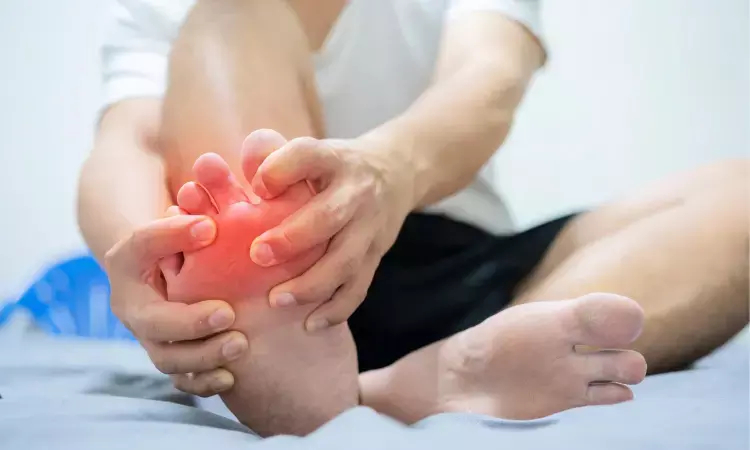- Home
- Medical news & Guidelines
- Anesthesiology
- Cardiology and CTVS
- Critical Care
- Dentistry
- Dermatology
- Diabetes and Endocrinology
- ENT
- Gastroenterology
- Medicine
- Nephrology
- Neurology
- Obstretics-Gynaecology
- Oncology
- Ophthalmology
- Orthopaedics
- Pediatrics-Neonatology
- Psychiatry
- Pulmonology
- Radiology
- Surgery
- Urology
- Laboratory Medicine
- Diet
- Nursing
- Paramedical
- Physiotherapy
- Health news
- Fact Check
- Bone Health Fact Check
- Brain Health Fact Check
- Cancer Related Fact Check
- Child Care Fact Check
- Dental and oral health fact check
- Diabetes and metabolic health fact check
- Diet and Nutrition Fact Check
- Eye and ENT Care Fact Check
- Fitness fact check
- Gut health fact check
- Heart health fact check
- Kidney health fact check
- Medical education fact check
- Men's health fact check
- Respiratory fact check
- Skin and hair care fact check
- Vaccine and Immunization fact check
- Women's health fact check
- AYUSH
- State News
- Andaman and Nicobar Islands
- Andhra Pradesh
- Arunachal Pradesh
- Assam
- Bihar
- Chandigarh
- Chattisgarh
- Dadra and Nagar Haveli
- Daman and Diu
- Delhi
- Goa
- Gujarat
- Haryana
- Himachal Pradesh
- Jammu & Kashmir
- Jharkhand
- Karnataka
- Kerala
- Ladakh
- Lakshadweep
- Madhya Pradesh
- Maharashtra
- Manipur
- Meghalaya
- Mizoram
- Nagaland
- Odisha
- Puducherry
- Punjab
- Rajasthan
- Sikkim
- Tamil Nadu
- Telangana
- Tripura
- Uttar Pradesh
- Uttrakhand
- West Bengal
- Medical Education
- Industry
SGLT2 inhibitors clinically beneficial in patients with gout, suggests review

USA: Sodium-glucose cotransporter type 2 (SGLT2) inhibitors may provide improved outcomes in treating gout and its common comorbidities, a recent review has shown. SGLT2 inhibitors are a popular drug class in the management of cardiometabolic and diabetic conditions.
The review, published in Nature Reviews Rheumatology, suggested that the mechanism of SGLT2 inhibition in patients with arthritic disease could provide anti-inflammatory benefits while reducing the risk of renal and cardiovascular outcomes in such patients—as the drug class is already indicated to treat.
Chio Yokose, Massachusetts General Hospital, Boston, MA, USA, and colleagues described the characteristics of gout and its most common comorbidities.
They noted that gout is the most common form of inflammatory arthritis worldwide, which is characterized by painful recurrent flares of inflammatory arthritis and is associated with a transiently increased risk of adverse cardiovascular events. Furthermore, gout is associated with various cardiometabolic–renal comorbidities such as chronic kidney disease (CKD), type 2 diabetes, and cardiovascular disease (CVD). These comorbidities, potentially combined with gout flare-related inflammation, contribute to persistent premature mortality in gout, independently of traditional cardiovascular risk factors and serum urate concentrations.
The researchers add, "Although better implementation of standard goud care could improve gout outcomes, there is a need for deliberate efforts to address the CV risk in gout patients to reduce mortality."
SGLT2 inhibitors are approved for multiple indications owing to their ability to lower the risk of hospitalizations for heart failure and CKD, all-cause, and cardiovascular death, making them an attractive treatment option for gout. These medications have been also shown to reduce serum urate concentrations, the causal culprit in gout risk, and are linked with a reduced risk of incident and recurrent gout, potentially due to their anti-inflammatory effects. Thus, SGLT2 inhibition could simultaneously address both gout symptoms and its comorbidities.
According to the authors, this is not the first analysis to consider a potential role in gout management for the SGLT2 inhibitor class.
A study presented during the European Congress on Rheumatology (EULAR) 2023 meeting in May 2023 showed initiating an SGLT2 inhibitor significantly lowered the risk of incident gout among at-risk patients with type 2 diabetes, compared to other drug classes, including GLP-1 receptor agonists (HR, 0.39), DPP-4 inhibitors (hazard ratio [HR], 0.54), and sulfonylurea (HR, 0.61).
These promising clinical data come with the disclosure that researchers are still seeking to understand the anti-gout and urate-lowering properties of SGLT2 inhibitors, Yokose, and colleagues noted. They suggested such mechanisms may be due to enhanced uricosuria and anti-inflammatory pathways in SGLT2 inhibition.
“Although additional research is needed to determine SGLT2 inhibitors' role in gout management, available evidence indicates that these drugs have the potential to improve outcomes among gout patients,” the researchers concluded.
Reference:
Yokose, C., McCormick, N., Abhishek, A., Dalbeth, N., Pascart, T., Lioté, F., Gaffo, A., FitzGerald, J., Terkeltaub, R., Sise, M. E., Januzzi, J. L., Wexler, D. J., & Choi, H. K. (2024). The clinical benefits of sodium–glucose cotransporter type 2 inhibitors in people with gout. Nature Reviews Rheumatology, 20(4), 216-231. https://doi.org/10.1038/s41584-024-01092-x
Dr Kamal Kant Kohli-MBBS, DTCD- a chest specialist with more than 30 years of practice and a flair for writing clinical articles, Dr Kamal Kant Kohli joined Medical Dialogues as a Chief Editor of Medical News. Besides writing articles, as an editor, he proofreads and verifies all the medical content published on Medical Dialogues including those coming from journals, studies,medical conferences,guidelines etc. Email: drkohli@medicaldialogues.in. Contact no. 011-43720751


